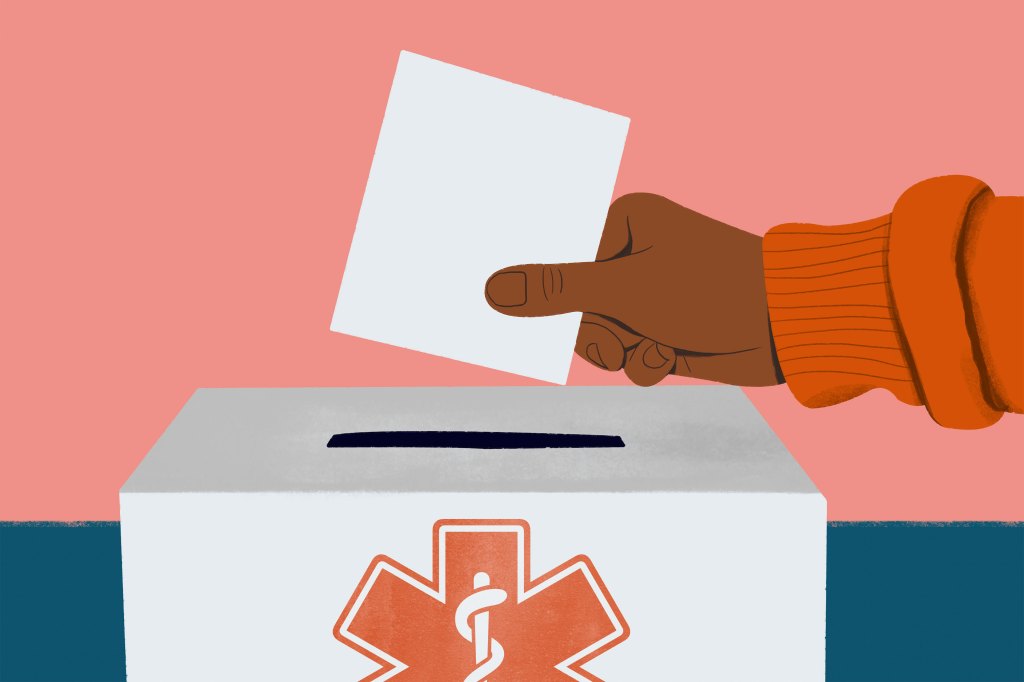Health care has ebbed and surged as an election issue throughout the presidential campaign. Here are the ways some of the most consequential changes in health policies could hinge on whether Vice President Kamala Harris or former President Donald Trump wins. Elections, Health Care Costs, Insurance, Medicaid, Pharmaceuticals, Public Health, States, The Health Law, Abortion, CDC, Drug Costs, FDA, NIH, Obamacare Plans, Out-Of-Pocket Costs, Premiums, Prescription Drugs, Reproductive Health, Subsidies, Transgender Health, U.S. Congress, Vaccines, Women’s Health KFF Health News
In the final days of the campaign, stark disagreements between Vice President Kamala Harris and former President Donald Trump over the future of American health care are on display — in particular, in sober warnings about abortion access, the specter of future cuts to the Affordable Care Act, and bold pronouncements about empowering activists eager to change course and clean house.
Trump and his campaign have been vague about plans on health care policies, though current and former Trump aides have published blueprints that go well beyond reversing programs in force under the Biden administration, to overhauling public health agencies and enabling Trump to quickly fire officials who disagree.
Harris, on the other hand, has staked out positions primarily preserving and protecting existing health care access — on abortion, transgender health care, insurance coverage, and more.
Here are some of the most consequential changes in health policies that could hinge on who wins the White House.
ACA Premiums
The election is likely to affect the cost of health insurance for millions who buy coverage on the Affordable Care Act marketplaces.
That’s because extra, pandemic-era subsidies that lower the cost of premiums will expire at the end of 2025 — unless Congress and the next president act.
Harris has pledged to make the enhanced subsidies permanent, while Trump has made no such commitment.
Letting them expire “would reduce fraud and waste,” said Brian Blase, a former Trump adviser who is president of the Paragon Health Institute, a conservative policy research firm.
About 19.7 million people with ACA coverage benefit from a subsidy — 92% of all enrollees. The expanded subsidies, started in 2021, helped increase ACA enrollment to a record high and reduce the uninsured rate to a record low.
They have also cut premium payments by an estimated 44%. Many pay no premiums at all.
Without congressional action, almost all ACA enrollees will experience steep increases in premium payments in 2026, according to KFF. The Urban Institute estimates 4 million people could wind up uninsured.
Letting the subsidies lapse could cause blowback for Republicans in 2026, said Jonathan Oberlander, a health policy expert at the University of North Carolina’s School of Medicine: “Is it worth the pain politically?”
— Phil Galewitz
Abortion
When he was president, Trump promised — and delivered — Supreme Court justices who would vote to overturn the constitutional right to an abortion. In the event of a second term, he has promised to leave abortion policy to the states — though he would have significant leeway to reduce access nationwide.
Harris has promised to restore the protections of Roe v. Wade, though doing so would require Congress’ help. At the very least, a Harris presidency would mostly preserve existing protections and prevent new federal restrictions.
Trump’s first actions would likely mirror those of many Republican presidents since the 1980s: defunding Planned Parenthood and the United Nations’ family planning agency, and, more recently, allowing employers with religious or moral objections to contraception to decline coverage through job-sponsored health plans.
But Trump could go considerably further, effectively banning abortion even in states where it is legal. For instance, the FDA could reduce availability of the abortion pill mifepristone or cancel its approval. This has been the subject of numerous lawsuits, including one before the Supreme Court that was recently revived.
Trump could also order the Justice Department to enforce the Comstock Act, an 1873 law that bans mailing “every article or thing designed, adapted, or intended for producing abortion, or for any indecent or immoral use.” That could apply not just to abortion pills, but also to supplies for abortion procedures.
— Julie Rovner
Drug Prices
Both campaigns say they are committed to lowering drug prices. Trump has offered few specifics, though the America First Policy Institute, a think tank led by close Trump allies, has put forward policies that are considerably less aggressive than Harris’ proposals.
Harris has said she would expand drug pricing negotiations and out-of-pocket drug spending caps enabled by the Inflation Reduction Act. She has also called for more transparency requirements for pharmacy benefit managers, or PBMs, the powerful drug-industry middlemen.
America First’s plan would cut costs by lowering reimbursements to doctors for some expensive infused drugs, using trade policy to force other developed countries to increase what they pay for drugs, and making more prescription medications available over the counter.
The plan makes no mention of bipartisan legislation under consideration in both chambers of Congress that seeks to achieve lower drug prices through new transparency requirements for PBMs.
— Arthur Allen
Trans People’s Health
The presidential election could determine whether transgender Americans hold on to broad protections ensuring access to gender-affirming medical care. Trump has said he would seek to ban hormone replacement therapy, gender reassignment surgery, and other treatments for minors — and make the services more difficult for adults to receive.
In the closing days of the campaign, Trump and his political action committees have leaned into divisive ads attacking Harris for past comments supporting access to care for transgender people who are incarcerated.
Backed by Republicans eager to stoke culture-war social issues, Trump has pledged to repeal Biden policies affecting transgender health care, including rules prohibiting federally funded providers and insurers from discriminating based on gender identity.
As some states passed legislation that opposed transgender rights, the Biden administration expanded coverage for gender-affirming care and increased research funding for the National Institutes of Health.
In a video on his campaign site, Trump vowed to order federal agencies to “cease all programs that promote the concept of sex and gender transition at any age” and bar government programs such as Medicare and Medicaid from paying for gender-affirming care.
Trump also said he would strip federal funding from hospitals that provide such care, create a right to sue doctors who perform gender-affirming procedures on children, and investigate whether the pharmaceutical industry and hospitals have “deliberately covered up horrific long-term side effects” of transition treatments.
Harris has been largely silent on the Trump campaign’s rhetoric targeting trans people. But she has said she would “follow the law” in providing transgender Americans the same right as others to access medically necessary care.
— Daniel Chang
Medicaid
Though the word “Medicaid” was barely uttered on the campaign trail this year, the election will determine future benefits for its 80 million primarily low-income and disabled enrollees.
“The stakes are very high,” said UNC’s Oberlander.
While Harris has described Medicaid as a key program to improve health, Trump has framed it as a broken welfare program in need of cuts.
Nearly half of Medicaid enrollees are children, and the program pays for about 40% of births nationwide.
The ACA expanded Medicaid coverage to nearly all adults with incomes up to 138% of the federal poverty level, or $20,783 this year. All but 10 states, which are GOP-led, have opted to expand their program.
The Biden administration has largely focused on efforts to protect and expand Medicaid to reduce the number of uninsured people.
The Trump administration, and GOP proposals since then, sought to reduce Medicaid spending by stiffening eligibility standards, such as adding work requirements, and by changing federal financing to a block grant, which would put more burden on states.
— Phil Galewitz
Shaking Up Biomedical Agencies
Trump said at an Oct. 27 rally in New York City that he would give anti-vaccine activist Robert F. Kennedy Jr. free rein to “go wild” on health and food policy in a second term.
Even a Republican-controlled Senate would be unlikely to confirm Kennedy for any top government position. Regardless of whether he had a specific role, RFK Jr.’s influence could be powerful, said Georges Benjamin, executive director of the American Public Health Association.
Kennedy said Trump promised to give him “control” of public health, including naming leaders of the NIH, FDA, and the Centers for Disease Control and Prevention. He has advocated for a doctor who made a name for herself as a right-wing health guru, Casey Means, to head the FDA. This week, in a discussion on CNN during which he put forward the debunked theory that vaccines cause autism, Trump transition team co-chair Howard Lutnick said Kennedy wanted data on vaccines “so he can say these things are unsafe,” at which point “the companies will yank the vaccines right off … the market.”
Numerous Trump allies have urged disempowering public health agencies — stripping the CDC of much of its research and promotional authority while streamlining NIH and adding congressional oversight over its grant-making.
Project 2025, the Heritage Foundation blueprint disavowed by Trump but whose authors include many former Trump officials, says the drug industry and other corporations have “captured” regulatory agencies: “We must shut and lock the revolving door” between agencies like the NIH, CDC, and FDA, and the industries they regulate, it states.
Kennedy recently posted on the social platform X that “FDA’s war on public health” — by which he meant restrictions on disproven therapies and cure-alls like raw milk and ivermectin — “was about to end.”
He warned FDA employees who are “part of the corrupt system” that they should “1. Preserve your records, and 2. Pack your bags.”
— Arthur Allen
KFF Health News is a national newsroom that produces in-depth journalism about health issues and is one of the core operating programs at KFF—an independent source of health policy research, polling, and journalism. Learn more about KFF.
USE OUR CONTENT
This story can be republished for free (details).





